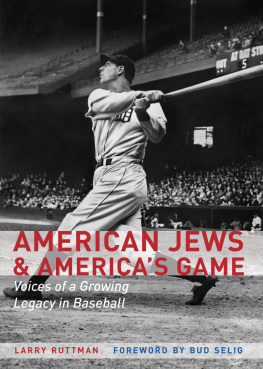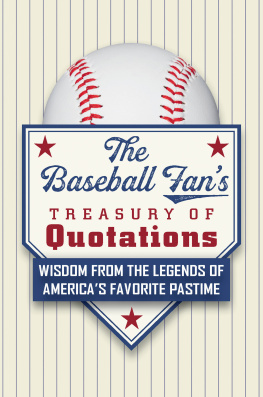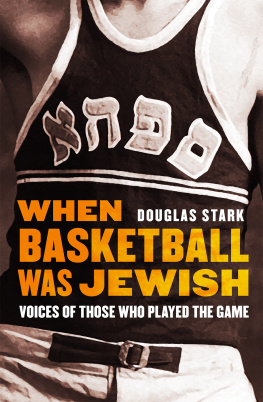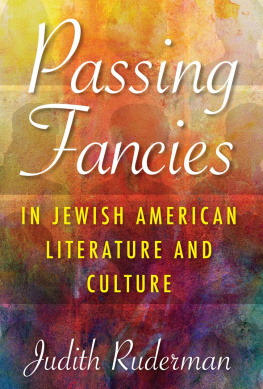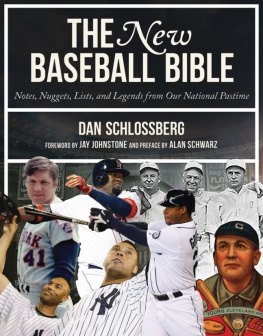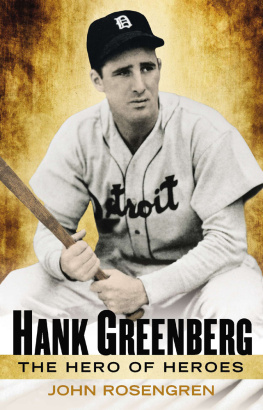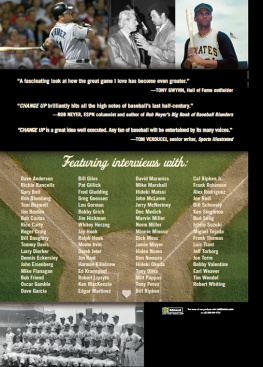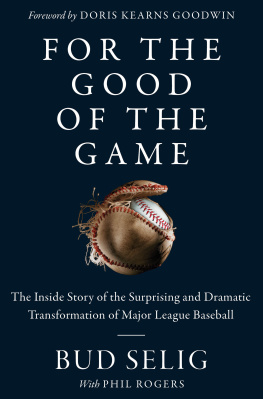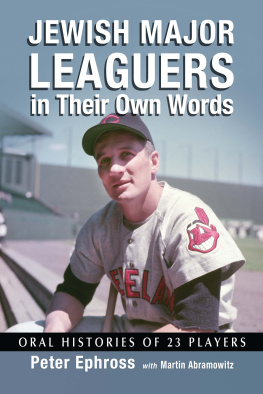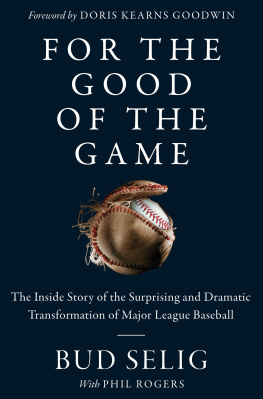
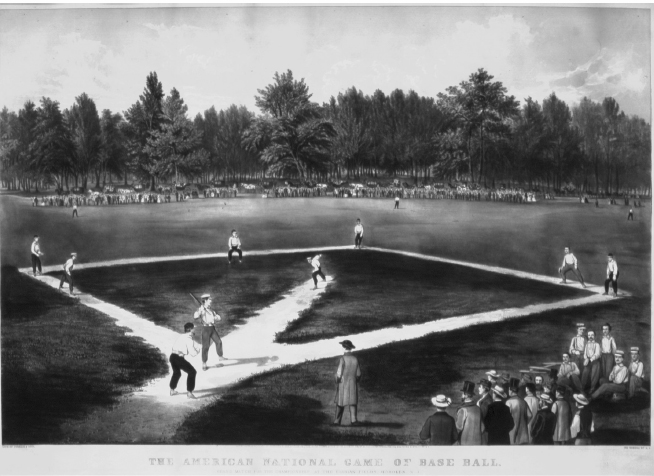
The Elysian Fields, Hoboken, New Jersey, the site of the first organized baseball game (1846). Courtesy of the National Baseball Hall of Fame Library, Cooperstown NY

2013 by Lawrence A. Ruttman
All rights reserved
Manufactured in the
United States of America
Library of Congress
Cataloging-in-Publication Data
Ruttman, Larry.
American Jews and Americas game: voices of a growing legacy in baseball / Larry
Ruttman; foreword by Bud Selig; introduction by Martin Abramowitz.
p. cm.
Includes bibliographical references and index.
Epub ISBN 978-1-4962-0948-1
Mobi ISBN 978-1-4962-0949-8
1. Jewish baseball playersUnited StatesBiography. 2. JewsCultural assimilationUnited States. 3. BaseballReligious aspectsJudaism. 4. BaseballUnited StatesHistory. I. Title.
GV 865. AIR 896 2013
796.3570922dc23 [B] 2012037942
Set in Scala by Laura Wellington.
Designed by Ashley Muehlbauer.
The publisher does not have any control over and does not assume any responsibility for author or third-party websites or their content.
For my wife, Lois Raverby Ruttman
Who gives my life order, support, and love always

Sandy Koufax, great athlete, courageous person, in the words of the late Marvin Miller. Artist unknown. Courtesy of the National Baseball Hall of Fame Library.
Illustrations
The Elysian Fields, Hoboken, New Jersey frontispiece
The great Sandy Koufax
Foreword
The historian Jacques Barzun was right when he said, Whoever wants to know the heart and mind of America had better learn baseball.
Larry Ruttman knows that too, and that is why I chose to write this foreword to his book American Jews and Americas Game: Voices of a Growing Legacy in Baseball . His stories cover almost one hundred years of American history and the place of American Jews in that history, in the words of Major League Baseball players and off-field people deeply enmeshed in the game. In Larrys telling, the history of baseball and many of its bright lights are recounted as well. This is a book that celebrates familybaseballs, yours, and mine.
From a professional standpoint, I can think of no greater honor than to serve as the commissioner of baseball. I have been privileged to lead the game I love since September 9, 1992, when, as chairman of the Major League Executive Council, I became the acting commissioner. At the time I told my wife, Sue, that I envisioned filling that role for several months. She was dubious about my prediction. I led the industry on an interim basis until 1998, when the Clubs appointed me as the ninth commissioner of baseball. (Sue knew better then, and she still does today.)
Sue knows that I love the game with all my heart and soul. I was a history major at the University of Wisconsin, and I have often viewed the history of our great nation through the prism of its national pastime.
The story of my family echoes those of so many other American families. I was blessed with wonderful parents who afforded me the opportunity to enjoy a great American childhood. My older brother, Jerry, and I could not have asked for stronger examples to follow. Our mother, Marie, taught us how to pursue our dreams and how to appreciate the world. A sixth-grade teacher, she instilled in us that education was paramount. Our father, Ben, imparted the importance of a work ethic to us. I learned not to do tomorrow what could be done today. Both of my parents wanted us not only to do well but also to do things the right way. Our household on the west side of Milwaukee was a haven for family, faith, and hard work.
The game of baseball was a staple of the Selig home, a microcosm for a nation that held the sport so dear to its history and identity. My parents recognized that baseball provided a way that they could bond with their sons, and they appreciated that my passion for the game resulted in friendships with others at school and in the neighborhood. It was through baseball that my parents saw my first streak of audacity, amusing them when I talked about one day owning a Major League team. But they encouraged me to work hard and to follow that dream.
I had always taken pride in my heritage and my hometown, but the arrival of the Braves from Boston to Milwaukee in 1953 crystallized the powerful sociological values of the grand old game for me. The Braves captured the hearts of the locals in no time, sparking a baseball euphoria in the city of Milwaukee and throughout the state of Wisconsin. As the franchise became a point of civic pride, baseballs innate ability to bring people together and transcend barriers began to resonate deeply within me.
The lives of the legends of this game tell the story of America itself. Jackie Robinson was born in Georgia to a single mother who led the only African American family on their block. As a boy, my favorite player was Joe DiMaggio, whose magnificence drew me to New York to watch him play at Yankee Stadium for my fifteenth birthday. Joe was the son of an Italian immigrant fisherman in San Francisco. Hank Aaron, Babe Ruth, and Ted Williams all represent marvelous American success stories. Another important career in baseball history belonged to Hank Greenberg.
Hank is considered by many to have been the first Jewish superstar in the sports world. Just as Hank was becoming a fixture in the game, near the end of the 1934 regular season, he was confronted with delicate personal decisionsones that had to be made in the public viewabout whether he would play on the holy days on the Jewish calendar. Hank treated those situations with great care, while enduring cruel taunts and slurs from the ignorant. Hank wanted to be judged on the way he played the game. No more, no less. He once said in reflection, I wanted to be known as a great ballplayer, period. As a player, as a teammate, and as a competitor, Hanks respect for baseball shaped the publics views of him more than anything else. His precedenta focused, determined resolveloomed very large within the framework of baseball history.
At a time when the world faced the most daunting of issues, Hank Greenberg did not wither from serving as a vital public face of baseball, one who carried a special significance for many Americans. He let his exceptional play on the field do the talking for him. As Hank was concluding his brilliant career in 1947 with the Pittsburgh Pirates, he also was helping to shape the mind of a player who was just beginning his own career. Jackie Robinson, our sports greatest pioneer, has cited Hank for being the first opposing player to provide words of support. Hank once told Jackie as they stood side by side at first base, Dont let them get you down.
Later on, Jackie reflected, Hank Greenberg has class. It stands out all over him.
It is powerful to consider that baseball was blessed to have some of its most exceptional ambassadors at a time when they were most needed. I have often said that baseball did not truly become the national pastime until Jackie Robinson set foot on the diamond at Ebbets Field on April 15, 1947. Jackie Robinson blazed the trail that made our game complete. To this day, Jackie Robinson and Hank Greenberg continue to represent excellence and grace. They helped to knock down the walls of ignorance within our game. In turn, our society at large benefited from playing witness to their courage from such a unique platform.
Next page
